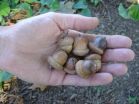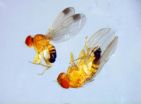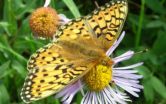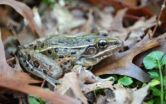(Press-News.org) One of the world's leading Internet security experts, Eugene Kaspersky, has described the World Cyber Security Technology Research Summit at Queen's University Belfast as key in preventing a Cyber World War.
Eugene Kaspersky, CEO and co-founder of the largest antivirus company in Europe, Kaspersky Lab, will be giving a keynote address at the second annual Cyber Security Technology Research Summit on Friday 16 March.
The cyber security guru is joining some of the world's leading cyber security experts and government policy makers from around the world for a two-day meeting of minds to combat future threats to global cyber security.
The annual Summit, held at the Centre for Secure Information Technology (CSIT), Queen's University - the UK's lead university centre for cyber security research, made headlines across the world when it was launched last year, and has attracted even more leading international experts in cyber security to this year's Summit in Belfast.
Speaking ahead of the event, Eugene Kaspersky said: "For almost a decade I've been doing my best to attract the attention of governments and officials around the world to the imminent threat of cyber-war and cyber-terrorism and the need to prevent it - but with limited effect. The World Cyber Security Technology Research Summit at Queen's is an excellent platform for getting the message across to those that count. This event is internationally important and significant as it addresses one of the most pressing issues of global security - cyber defence.
"We have entered a new age, the Age of Cyber-Warfare, and decisive international action needs to be taken immediately if we don't want to see our technology-permeated world – where everything is managed by IT systems – crumble around us. A crucial part of that action is technology research, and the Cyber Summit at Queen's University in Belfast is a big step in the right direction, bringing researchers, experts and policy-makers together and creating an exceptional platform for productive dialogue and cooperation."
Queen's University Professor John McCanny, CSIT Principal Investigator, said: "The success of the inaugural World Cyber Security Technology Research Summit last year is reflected by the fact that even more of the biggest names in global cyber security are attending this year's summit at Queen's. This event is unique in that it is a meeting of minds of cyber security experts, researchers and government policy makers from around the world.
"We at CSIT recognise there are two aspects of cyber security; defence and opportunity. A safe and secure Internet acts as a platform for economic growth and societal development. We have seen the democratising effects of the Internet in countries around the world; we have also seen how health, business and the wider development of mankind are supported by the information age that we all live in. Together at Belfast 2012 we aim to identify, map out and ultimately combat the biggest threats to our online security so that we can help make the Internet of Tomorrow a safe and secure platform for the next phase of the human journey.
"Cyber security affects us all. Be it via smartphones and their apps, online banking or through the most intricate of government defence systems, we are all at risk of cyber security attacks. This Summit at Queen's University is of huge international importance and we welcome the very best global cyber security experts to Belfast for this highly significant event."
Guests at the Summit include speakers from Kaspersky Lab, the U.S. Department of Homeland Security, the UK's Home Office, the European Commission, McAfee, the U.S. Cyber Consequences Unit, Cisco, SRI International, Georgia Tech, IBM and CyLabs.
INFORMATION:
For media enquiries please contact Claire O'Callaghan on +44 (0) 289 097 5391 / (0) 781 441 5451 or at c.ocallaghan@qub.ac.uk
Notes to Editors:
1. The following individuals are available for interview. Interview bids please to Claire O'Callaghan at the above phone numbers/e-mail.
Mr Eugene Kaspersky, Kaspersky Labs
Mr John Bumgarner, US Cyber Consequences Unit
Dr Douglas Maughan, Department of Homeland Security
Mr Raj Samani, McAfee
Godfrey Gaston – CSIT Director – 07792449676
Stephen Wray – CSIT Commercial Director – 07811373815
Philip Mills – CSIT Business Development Manager – 07711490200
2. The Centre for Secure Information Technologies (CSIT) is a new innovation and knowledge centre based at Queen's University Belfast's Institute of Electronics, Communications and Information Technology (ECIT) in the city's Northern Ireland Science Park. CSIT creates the security infrastructure needed to safeguard the security of information stored electronically, both at home and in the workplace.
END
PITTSBURGH, March 16 – Researchers at the University of Pittsburgh School of Medicine have identified a cell-signaling pathway that plays a key role in increasing insulin secretion during pregnancy and, when blocked, leads to the development of gestational diabetes. Their findings are available online today in Diabetes, one of the journals of the American Diabetes Association.
During pregnancy, pancreatic beta cells should expand and produce more insulin to adapt to the needs of the growing baby, explained senior investigator Adolfo Garcia-Ocana, Ph.D., associate professor ...
CHICAGO – In a study that included a nationally representative sample of nearly 45,000 adults, participants who met more of seven recommended cardiovascular health behaviors or factors (such as not smoking, having normal cholesterol levels, eating a healthy diet), had a lower risk of death compared to participants who met fewer factors, although only a low percentage of adults met all seven factors, according to a study appearing in JAMA. The study is being published early online to coincide with its presentation at a specialty meeting of the American Heart Association.
"Cardiovascular ...
The northeastern U.S. should prepare for a surge in Lyme disease this spring. And we can blame fluctuations in acorns and mouse populations, not the mild winter. So reports Dr. Richard S. Ostfeld, a disease ecologist at the Cary Institute of Ecosystem Studies in Millbrook, NY.
What do acorns have to do with illness? Acorn crops vary from year-to-year, with boom-and-bust cycles influencing the winter survival and breeding success of white-footed mice. These small mammals pack a one-two punch: they are preferred hosts for black-legged ticks and they are very effective ...
Nanoparticles containing chitosan have been shown to have effective antimicrobial activity against Staphylococcus saprophyticus and Escherichia coli. The materials could be used as a protective wound-healing material to avoid opportunistic infection as well as working to facilitate wound healing.
Chitosan is a natural, non-toxic and biodegradable, polysaccharide readily obtained from chitin, the main component of the shells of shrimp, lobster and the beak of the octopus and squid. Its antimicrobial activity is well known and has been exploited in dentistry to prevent ...
New biotechnological and chemical methods will facilitate efficient production of chemicals, materials and fuels from renewable natural resources. The Academy of Finland Centre of Excellence (CoE) in White Biotechnology – Green Chemistry Research focuses on the research and development of microbial cells, or cell factories, for producing new useful compounds from sugars in plant biomass. These compounds can be used, for example, for manufacturing bioplastics or in medical applications.
"By means of gene technology, we can modify microbial metabolism and thereby produce ...
Coming from the Asian continent, Drosophila suzukii has only been in Spain for a short time. Far away from slipping through into the Iberian Peninsula, it accelerated towards the north of Europe where it has already crossed the Alps. Amongst its preferred target are cherries and red fruits but any type of fruit is suitable for it to lay its eggs. This insect is posing a threat to the fruit of more and more European countries.
"Out of the 3,000 known species of Drosophilae, commonly named the vinegar fly, only two are potentially dangerous to fruit crops. One of them is ...
Have you ever wondered how life is sustained in environments like deserts, deep seas or the polar regions? How do organisms adapt and thrive in such harsh conditions, and what challenges do they face as a result of human activities and climate change, especially climate "extremization"? Shedding light on some of these issues is the objective of the European Science Foundation's (ESF) session on 27 March at Planet Under Pressure 2012. The session will look at different aspects of life in extreme environments - from knowledge to sustainable exploitation of new resources under ...
Montreal, March 16, 2012 – A clinical study co-led by the Montreal Heart Institute and Innovaderm Research Inc., which was presented today at the annual meeting of the American Academy of Dermatology, shows that a new treatment for psoriasis could be associated with a significant decrease in vascular inflammation, a major risk factor of cardiovascular disease.
Psoriasis is a chronic inflammatory disease of the skin and joints that affects up to 3% of the population. This disease is associated with a greater risk of heart attack (infarction) and stroke. The goal of this ...
Early snowmelt caused by climate change in the Colorado Rocky Mountains snowballs into two chains of events: a decrease in the number of flowers, which, in turn, decreases available nectar. The result is decline in a population of the Mormon Fritillary butterfly, Speyeria mormonia.
Using long-term data on date of snowmelt, butterfly population sizes and flower numbers at the Rocky Mountain Biological Laboratory, Carol Boggs, a biologist at Stanford University, and colleagues uncovered multiple effects of early snowmelt on the growth rate of an insect population.
"Predicting ...
In the wilds of New York City--or as wild as you can get that close to skyscrapers--scientists have found a new leopard frog species.
For years, biologists mistook it for a more widespread variety of leopard frog.
While biologists regularly discover new species in remote rainforests, finding this one in ponds and marshes--sometimes within view of the Statue of Liberty--is a big surprise, said scientists from the University of California, Los Angeles; Rutgers University; the University of California, Davis and the University of Alabama.
"For a new species to go unrecognized ...



